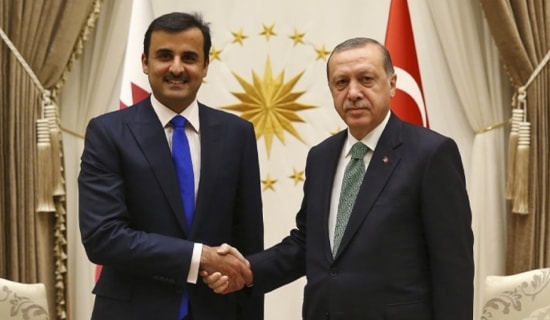In an article he published in the Saudi daily Independent Arabia, Lebanese-born American scholar Walid Phares, who served as a Middle East affairs advisor to Donald Trump during the latter's presidential campaign, criticizes the Biden administration's "hesitant" Iran policy and its silence in the face of the Iran-backed militias' aggression and provocations in the Middle East. Phares writes that this hesitation is a direct continuation of the policy adopted by former U.S. President Barack Obama when he began his first term in 2009, a policy which culminated in the JCPOA nuclear deal with Iran. American elements that profited from the nuclear deal, he adds, became a lobby that pressured the Obama administration to preserve this deal at all costs, and this is why the U.S. avoided responding to the aggression of Iran and its militia proxies. Former U.S. President Donald Trump had a more hardline policy towards Iran and even ordered the assassination of IRGC Qods Force Commander Qasem Soleimani, Phares says, but this toughness "collapsed overnight the moment Biden entered the White House." Biden restored Obama's policy, quickly removed the Houthis from the list of designated terrorist organizations, transferred billions of dollars to Iran, and remains silent in the face of Iranian provocations to this day. Phares wonders how far Biden will take this policy and what it will take for him to change it.

Walid Phares (Image: Twitter.com/WalidPhares/photo)
The following is a translation of excerpts from Phares's article in Independent Arabia: [1]
"For three years, since the first ten days of the [Biden] administration in January 2021, we have heard voices in the Middle East wondering why the Biden administration is so hesitant when it comes to the provocations of the Iranian militias against American forces [in the region]. These provocations have spread from Iraq to Syria and Yemen, [and include] terrorism against America's allies in the Middle East…
"The previous administration, under President Donald Trump, responded [to such provocations] in several places, and even reached the IRGC leadership when it killed Qods Force Commander Qasem Soleimani and senior Iraqi PMU official Abu Mahdi Al-Muhandis. During Trump's term, the dominant view was that responses must be tit-for-tat. This is the opposite of the view held by the Obama-Biden team, which advocated such a response only when Iranian attacks continued, [and even then advocated] minimal responses, rather than maximal ones…
"The question that arises today is: Will Washington adhere to such an Iran policy forever and ever, or even for the next year or so until the 2024 presidential elections? What circumstances might cause Washington to entirely or partially change this ongoing policy of moderation? And what outcome can be expected if it does not change this policy?...
"America's moderate policy began with the Obama administration, with the letter [Obama] sent to [Iranian Supreme Leader Ali] Khamenei in June 2009. At its core, this policy defined [U.S.] relations with the [Iranian] regime – or more specifically, the developing ties between the U.S. and the Iranian leadership – as a 'red line' [i.e., as an asset that must not be jeopardized]. This characterized Obama's time in office from its beginning in 2009 until its end in 2017, and particularly after the signing of the JCPOA nuclear deal in 2015. This policy was adopted because of the 'deal' that was reached behind the scenes of the nuclear agreement – that is, because of the profits reaped by the U.S. and the West.
"This 'deal' became the core consideration in defining the 'red lines' from the perspective of America's national security. That is, the 'nuclear agreement lobby' uses these interests to pressure the American administration to not make any decision that would cause the Iranian regime to withdraw from the deal. This policy was so comprehensive that it softened the Obama and Biden administrations' stance regarding Tehran's behavior, and even delayed Trump from taking action against Iran in response to its violations.
"In short, the lack of any response to the Iranian acts of aggression against the region and against America's interests… is closely linked to the pressure being applied by this lobby on the decisionmakers in Washington. This was evident in the piracy operation that was carried out by IRGC ships against an American vessel that got lost in the [Persian] Gulf during Obama's term in office. The Republican opposition said [at the time] that [America's] negotiations with Tehran on this matter were an embarrassment.
"For the four years that Trump was in office, the American policy was different, but the practical impact that the lobbies had on Washington's bureaucracy remained constant.
"The Trump administration made big decisions, such as: withdrawing from the JCPOA; adding the IRGC and the Houthis to the list of designated terrorist organizations; changing the rules of the conflict with Tehran and taking action to isolate the [Iranian] regime from the international [community]. These are big changes, but what was missing was a plan to support the Iranian people in overthrowing their regime – because somebody convinced Trump that 'a better deal could be achieved'…
"Despite these changes, which ended the [policy of] moderation for four years, [Trump's] tough Iran policy collapsed overnight the moment Biden entered the White House.
"From the moment it removed the Houthis from America's list of designated terrorist organizations, the Biden administration quickly brought back Obama's equation. This included transferring billions [of dollars] to Tehran, criticizing the Arab and Israeli opponents of the Islamic Republic [of Iran], giving up on [Iranian] opposition forces and remaining silent in the face of Iran's expansion [in the Middle East] at the expense of [America's] allies.
"This clarifies that the [Americans'] dedication to their shared interests with Iran have become more important than any other alliance in the region. Accordingly, the more precise [question] is: How far will Washington go in defending its interests by not responding to Iran's acts of aggression? Another question is: How long will Iran be able to continue crossing American red lines in the region before sparking a strategic American response?..."
[1] Independentarabia.com, December 27, 2023.




